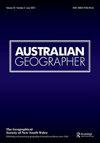Encountering and Experiencing the Geopolitics of Tourism (Im)Mobilities: A Case of China’s Tourism in the South China Sea
IF 2
2区 社会学
Q2 GEOGRAPHY
引用次数: 0
Abstract
ABSTRACTThis research examines the geopolitical entanglements of China’s tourism in the South China Sea (SCS) and the geopolitical implications of uneven mobility rights on tourists’ geopolitical subjectivation. We show that maritime territorialisation in the SCS is mobile and constituted by tourism mobilities. However, although tourism mobility control constitutes and performs state territorialisation, it also generates unsatisfied internal bordering effects. We reveal that uneven mobility rights premised on territorial geopolitics are unevenly experienced by tourists. Within the contemporary deeply embedded structure of the territory-nation-state, mobility governance, hierarchy, inequity, and unevenness driven by national interests, security, and secrecy are widely accepted and taken for granted. The encounters and affective engagements of tourism mobility regulations in the SCS, intersecting with everyday experiences of mobility hierarchies as well as state geopolitical processes, contribute to shaping individuals’ geopolitical identity. This promotes the internalisation of the contemporary mobility regime and facilitates the naturalisation of state geopolitical competitions. By exploring the geopolitical experiences of selective mobility control and its geopolitical effects on tourists, this research sheds light on the uneven political spatiality of everyday tourism mobilities and offers a more nuanced and intimate understanding of the geopolitics of tourism (im)mobilities at the micro-scale.KEYWORDS: Tourism (im)mobilitiestourism geopoliticsmaritime territorialisationmaritime borderSouth China Seamobility hierarchy Disclosure statementNo potential conflict of interest was reported by the author(s).Additional informationFundingThis work was supported by National Natural Science Foundation of China: [Grant Number 42230705]; National Natural Science Foundation of China: [Grant Number 42301259].旅游地缘政治的遭遇与体验——以中国南海旅游为例
摘要本研究考察了中国在南海旅游的地缘政治纠缠,以及游客不均衡的流动权对其地缘政治主体化的地缘政治影响。我们表明,南海的海洋领土划分是可移动的,由旅游流动性构成。然而,尽管旅游流动控制构成并执行了国家领土化,但它也产生了不满意的内部边界效应。研究发现,以地域地缘政治为前提的不均衡流动性权利在游客体验中存在不均衡。在当代根深蒂固的领土-民族-国家结构中,由国家利益、安全和保密驱动的流动治理、等级制度、不平等和不平衡被广泛接受并视为理所当然。在南南亚,旅游流动规则的遭遇和情感参与,与流动等级的日常经验以及国家地缘政治进程相交叉,有助于塑造个人的地缘政治身份。这促进了当代流动性制度的内部化,并促进了国家地缘政治竞争的归化。通过探索选择性流动控制的地缘政治经验及其对游客的地缘政治影响,本研究揭示了日常旅游流动的不均匀政治空间性,并在微观尺度上对旅游流动的地缘政治有了更细致、更深入的理解。关键词:旅游(im)流动性、旅游地缘政治、海洋领土化、海洋边界、中国南海海上流动性等级披露声明作者未报告潜在的利益冲突。本研究由国家自然科学基金资助:[批准号42230705];国家自然科学基金项目:[批准号42301259]。
本文章由计算机程序翻译,如有差异,请以英文原文为准。
求助全文
约1分钟内获得全文
求助全文
来源期刊

Australian Geographer
GEOGRAPHY-
CiteScore
4.10
自引率
8.30%
发文量
33
期刊介绍:
Australian Geographer was founded in 1928 and is the nation"s oldest geographical journal. It is a high standard, refereed general geography journal covering all aspects of the discipline, both human and physical. While papers concerning any aspect of geography are considered for publication, the journal focuses primarily on two areas of research: •Australia and its world region, including developments, issues and policies in Australia, the western Pacific, the Indian Ocean, Asia and Antarctica. •Environmental studies, particularly the biophysical environment and human interaction with it.
 求助内容:
求助内容: 应助结果提醒方式:
应助结果提醒方式:


